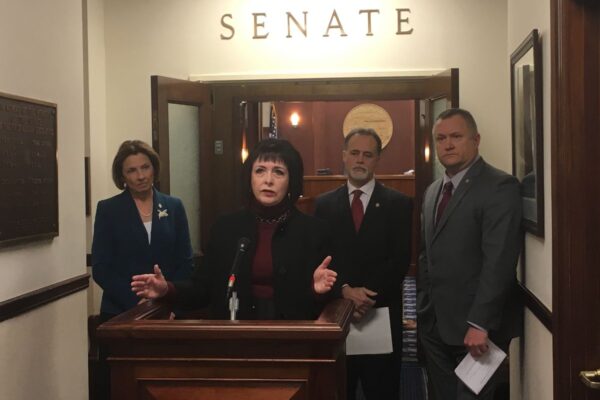This piece also appeared in the Anchorage Daily News.
Here is a statement you won’t hear often: Our lawmakers are doing the right thing and acting responsibly.
I know that seem might seem counterintuitive, so let me explain.
Recently, a group of state senators that included Senate President Cathy Giessel and most of the Senate Judiciary Committee held a press conference to announce they will slow down and take the time to thoroughly, thoughtfully review Gov. Mike Dunleavy’s package of bills touted as a repeal of criminal justice reform measures popularly known as Senate Bill 91.
In so doing, these senators acknowledged what most legislators and engaged members of the public can clearly see from the data provided by the Dunleavy administration during legislative briefings — the system we had before SB 91 didn’t work, so just repealing the bill and going back to that system isn’t the answer.
Before SB 91 was passed in 2016, our justice system was in crisis. Crime was rapidly increasing, our prison population was rising three times faster than our resident population, and we had a sky-high 67 percent recidivism rate. That means two of every three people being released were going right back in, at a cost of more than $150 per day, or roughly $55,000 per year.
A decade of “tough on crime” policies led to more Alaskans in prison and more crime — the worst possible public policy outcome.
Sen. Mike Shower hit this point on the head during the press conference, saying, “We don’t just want to necessarily go back to what we had before, because it wasn’t necessarily working.”
Further complicating matters is increasing evidence justice reform is starting to work. Data presented by Gov. Dunleavy’s Department of Corrections shows recidivism has begun to drop sharply, going from 67 percent to 61 percent in just the two years since reform was passed.
Reducing recidivism was a major goal of justice reform, because when you reduce recidivism, you reduce the long-term number of crime victims.
After hearing these numbers, conservative Rep. Tammie Wilson, R-North Pole, acknowledged, “We may have actually got something right in SB 91.”
She is right. We did.
The rush to repeal justice reform and send us back to that broken system assumes harsher sentences are an effective way to stop crime. We all want to see those who do wrong to our loved ones punished, but harsher punishments unfortunately don’t stop bad behavior from happening.
According to the U.S. Justice Department:
“Prisons are good for punishing criminals and keeping them off the street, but prison sentences (particularly long sentences) are unlikely to deter future crime. Prisons actually may have the opposite effect: Inmates learn more effective crime strategies from each other, and time spent in prison may desensitize many to the threat of future imprisonment.”
This might explain how Alaska found itself in the position prior to passing reform of paying for bigger prison populations and then seeing crime rates go up anyway.
So what does reduce crime? Research shows that making accountability for offenses swift and certain is more effective than harsher sentences.
If you think about it, this makes perfect sense. We all know consequences for lying on our tax returns can be severe, but if budget cuts caused a massive layoff of IRS enforcement personnel and they announced there weren’t the resources to audit anyone one below a certain income level, how concerned do you think folks would be about fudging the numbers to save some money?
It is no wonder then that we’ve seen crime rise in the wake of not only a statewide economic downturn and the national opioid crisis arriving in Alaska, but also after years of cuts to state and local law enforcement.
The Alaska Department of Law reported in early 2017 that they declined more than 7,000 prosecutions since fiscal 2014 solely for budget reasons. Those were cases where someone was caught and charged, but under-funding of the justice system meant no accountability was delivered.
It wasn’t hard for those inclined to commit crime to notice — they were the ones whose cases were dropped.
If we want to make Alaska safer, we need to be honest about at what has been happening and why. The truth is SB 91 was a response to our crime and prison problems, not the cause of them.
There is no doubt that Alaskans want lawmakers to make public safety a priority, but the answer isn’t to hastily return to a failed system that the state’s own data shows put more Alaskans in prison, drove up state budgets, and made us less safe.
Instead, lawmakers should take their time to listen to law enforcement professionals, corrections officials, affected Alaskans and their families, and folks who have lived experience within the system and craft reasonable, responsible, and data-driven policy changes that will improve the system.
We don’t know where this discussion will ultimately go, but it is heartening to see our lawmakers starting out by taking this process seriously. Good for them — and us.
Casey Reynolds has lived in Alaska since 1989 and is a proud graduate of Bartlett High School and the University of Alaska. He currently serves as communications director for the American Civil Liberties Union of Alaska.

